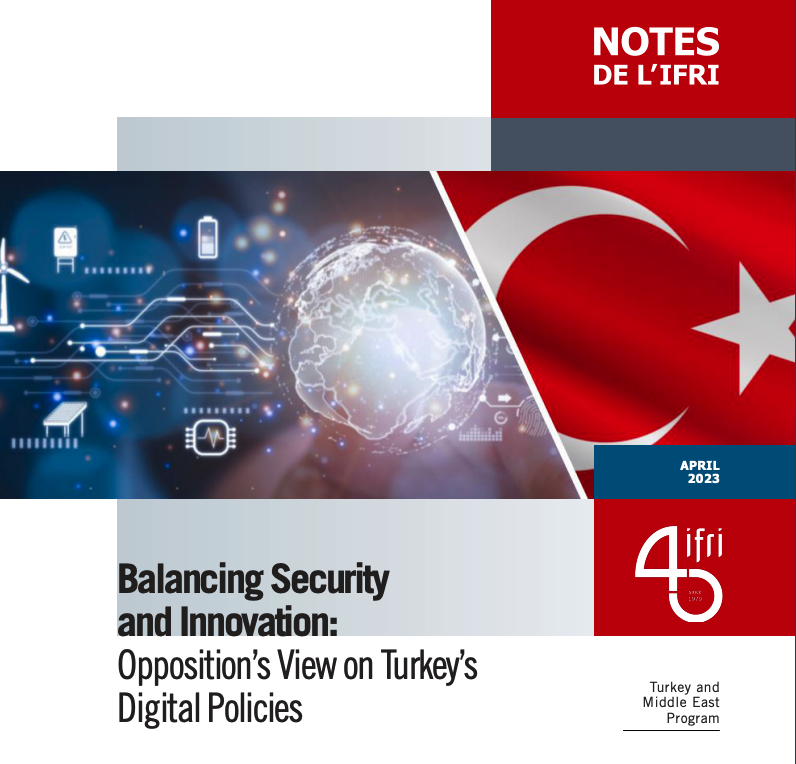The upcoming presidential and parliamentary elections in Turkey on May 14, 2023, are expected to be closely contested. Polls suggest that the ruling AK Party-led People’s Alliance will lose its majority in parliament, resulting in a hung lower house.
This would create an opportunity for multiparty dialogue and temporary alliances on specific policy issues, leading to legislation that is the result of multiparty bargaining rather than the agenda of a dominant party. Against this backdrop, it is crucial to understand the Turkish opposition’s views on a variety of policy issues, with digital policies being a particularly underexplored one.
At the intersection of political, economic, and technological issues, digital policies are regulations that have to adapt to a rapidly changing landscape of technological advances on a global scale. Turkey, as a regional power and an upper-middle-income economy, has attempted to take advantage of technological innovations to further promote economic growth and national security purposes. However, the AK Party government’s efforts have been met with skepticism from opposition groups as they have fallen short of protecting individual rights and freedoms online.
The study is organized into four sections, with an analysis of the political situation on the eve of the upcoming elections, a description of the technological ecosystem in Turkey, an analysis of the evolution of digital policies in Turkey under the AK Party’s successive governments, and a detailed overview of the main opposition parties’ digital policy positions. This study thus provides insight into the future of digital policies in Turkey and the potential impact of the upcoming elections on this pivotal issue.
By Ussal Sahbaz and Hasan Selim Özertem, French Institute of International Relations (IFRI), April 2023.
Abstract
The upcoming presidential and parliamentary elections in Turkey on May 14,
2023, are expected to be closely contested. Polls suggest that the ruling AK
Party-led People’s Alliance will lose its majority in parliament, resulting in a
hung lower house. This would create an opportunity for multiparty dialogue
and temporary alliances on specific policy issues, leading to legislation that
is the result of multiparty bargaining rather than the agenda of a dominant
party. Against this backdrop, it is crucial to understand the Turkish
opposition’s views on a variety of policy issues, with digital policies being a
particularly underexplored one.
At the intersection of political, economic, and technological issues,
digital policies are regulations that have to adapt to a rapidly changing
landscape of technological advances on a global scale. Turkey, as a regional
power and an upper-middle-income economy, has attempted to take
advantage of technological innovations to further promote economic growth
and national security purposes. However, the AK Party government’s efforts
have been met with skepticism from opposition groups as they have fallen
short of protecting individual rights and freedoms online.
The study is organized into four sections, with an analysis of the political
situation on the eve of the upcoming elections, a description of the
technological ecosystem in Turkey, an analysis of the evolution of digital
policies in Turkey under the AK Party’s successive governments, and a
detailed overview of the main opposition parties’ digital policy positions. This
study thus provides insight into the future of digital policies in Turkey and
the potential impact of the upcoming elections on this pivotal issue.
Résumé
Les prochaines élections présidentielles et législatives en Turquie, qui se
tiendront le 14 mai 2023, devraient être très disputées. Les sondages
suggèrent que l’Alliance populaire dirigée par l’AKP au pouvoir perdra sa
majorité au parlement. Cette situation ouvrirait la voie à un dialogue
multipartite et à des alliances occasionnelles sur des questions spécifiques,
conduisant à l’adoption de législations qui seraient le résultat de négociations
plutôt qu’issues du programme d’un parti dominant. Ce sera notamment le
cas des politiques numériques, une question peu étudiée sur laquelle il est
nécessaire de comprendre les positions défendues par les partis de
l’opposition.
À l’intersection de questions politiques, économiques et technologiques,
les politiques numériques désignent les efforts déployés par les États pour
élaborer des réglementations qui doivent s’adapter à un paysage en évolution
rapide, caractérisé par des avancées technologiques à l’échelle mondiale. La
Turquie, en tant que puissance régionale à revenu intermédiaire supérieur, a
tenté de tirer parti des innovations technologiques pour promouvoir sa
croissance économique et sa sécurité nationale. Toutefois, les efforts du
gouvernement de l’AKP ont été accueillis avec scepticisme par les groupes
d’opposition, car ils n’ont pas permis de protéger les droits et libertés
individuels.
Cette note est organisée en quatre grandes parties, dont une analyse des
perspectives politiques à la veille des prochaines élections, une description
de l’écosystème technologique en Turquie, une analyse de l’évolution des
politiques numériques en Turquie sous les gouvernements de l’AKP, et enfin
un exposé détaillé des positions des principaux partis d’opposition en
matière de politique numérique. Cette étude donne ainsi un aperçu de
l’avenir des politiques numériques en Turquie et de l’impact potentiel des
prochaines élections sur cette question importante.

